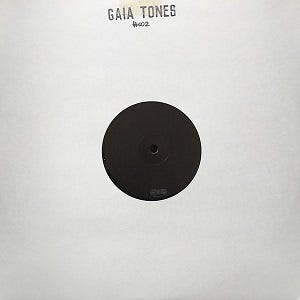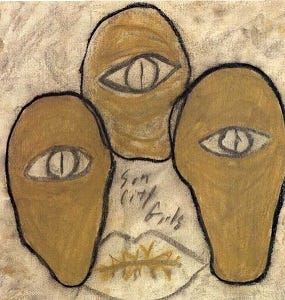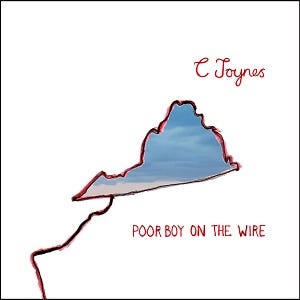RECENT LISTENING #25
More Klementines, Gaia Tones, Natural Dice, Sun City Girls, C. Joynes, Horsegirl
MORE KLEMENTINES sk8 @ yr own rsk (TWIN LAKES) I have claimed in these pages before that More Klementines, of Connecticut’s greater New Haven area, are one of our finest 21st C. Appalachian krautrock groups, and here they are with their “first post-COVID jam,” a session recorded during the summer of 2020 and released as a digital LP on Bandcamp a couple months ago (okay, four months ago and counting). That first Covid summer, More Klementines bassist Jon Schlesinger passed the strange times building a skate ramp in his backyard; one afternoon between sessions the trio set up their musical gear on the ramp (as depicted on the album cover) and blasted for an afternoon, a different type of session, here distilled down into the tried-and-true “two side-long jammers” psych-rock LP template. That’s Michael Kiefer on drums, Schlesinger on bass, and Steubs (just Steubs) on guitar, clearly bursting with excitement and ideas at the opportunity to be playing together after an extended delay, not to mention outside on a lovely summer day. Music tumbles out and all over throughout, via good ole amplified electric guitar and bass, both instruments heavily FX’d psych-jam style, played and looped live to create improvised psychedelic latticework, while Kiefer’s steady work on the trap set patiently hangs in and hangs out, putting it all in various temporary pockets, and only when necessary. Like at the beginning of side two “Backside” (yep side A is called “Frontside”) when the heavily distorted bass guitar is free-falling precipitously all by itself through inner space, on and on forever (i.e. a couple very long minutes) until Kiefer swoops in and grounds it safely with a sudden light but fast and insistent motorik beat. (And hey, new vinyl from More Klementines coming this August on Feeding Tube/Twin Lakes! Now with four tracks instead of two! And the cover might be a New Day Rising homage…)
GAIA TONES Chains/Shackles 12” (GAIA TONES) Needs a repress and some copies in the States. Gaia Tones is a shadowy electronic music collective, probably from London, and all their stuff is primo “free dub,” as they describe it on their Bandcamp page, but I’m pretty sure this release is the one that gets the absolute deepest. Side A “Chains” is indeed a true 15-minute deepslayer, using that basic 4-on-the-floor hi-hat to drive deep echoing clinks and clanks and drops that shatter in space, the sounds of chains and shackles clanking and reverberating over centuries, across and through and at the bottom of the deepest of oceans. After this utter heaviness the B-side “Shackles” comes off as just a little lighter, maybe because of the Farfisa-style organ. This is the 2nd of two Gaia Tones 12-inches that were released in 2020, and recently here in 2022 they’ve released their fifth overall record, called Dream, and you can order one on Bandcamp direct from Gaia Tones in England but it’ll cost $16 USD for the record plus another $25 for the shipping. Naturally I’m like, “This is the internet, let me hear it on YouTube or whatever before I spend $41 on an EP”… but I can’t find a way to listen to it anywhere on the internet, which I’m generally pretty good at doing, so you know something’s up.
NATURAL DICE s/t CS (RADICAL DOCUMENTS) Long-distance guitar duets between two excellent players, Jason Henn (of Honey Radar) and Dan Melchior. Melchior’s music and playing I know very well (he even took a request by me back when he was doing some online busking, that was fun), although Honey Radar I’ve barely heard and have yet to fully register. Regardless, both Henn and Melchior play in compatible styles that are at once rootsy and space-age, at once bluesy/pentatonic and noise/textural. Sometimes it sounds like Dickey Betts recording home demos with Lou Reed, sometimes it sounds like Lee and Thurston jamming in a tour bus behind a big outdoor Lollapalooza 1995 stage, prepping for many sublimated classic-rock moves to come, and sometimes it gets weirder than that… but it always sounds like Natural Dice.
SUN CITY GIRLS Torch of the Mystics LP (ABDUCTION) Or as I call it SCORCH of the Mystics, back on the turntable tonight as I settle down for a once-every-three-years relisten to this all-time classic of raw electric power-trio ethno-psychedelia, this time while reading the interview I forgot Byron Coley did with SCG bassist/vocalist/etc Alan Bishop back in 2015 when this reissue came out. Apologies that the interview has an edgelord title that will only get more unfortunate as the days and weeks go by, because other than that it’s a great piece, filled with informative details like a breakdown of which Torch tracks were rehearsed and which were completely improvised. I was a little surprised to see “Cafe Batik” in the latter category, less so “Tarmac 23,” “Papa Legba,” and “Burial in the Sky” (especially the last two, which sound like they could *only* be improvised, whereas “Tarmac 23” does have an actual repeated riff). “Cafe Batik” seems to have an assured and repeatable vocal melody, albeit in Alan’s trademark psychotronic falsetto, and any actual words scrambled through his trademark omnilingual nonsense filter. After all, SCG has been known to do covers of super-obscure international pop songs without giving (or not being able to give) credit, and maybe “Cafe Batik” is one of these. But nope, it’s fully improvised, which also makes sense, especially given how Rick Bishop’s electric keyboard part vamps… and vamps… and (vampiristically) vamps. The SCG classic “Space Prophet Dogon,” not surprisingly, is confirmed by Alan as one of the composed and rehearsed songs on the album, but as he says, “we didn't have endings to those songs until we recorded them,” so the ending of this version, from about the 4:30 mark when Alan’s last vocal chorus ends to the track’s final dissipation at the 7:04 mark, is indeed improvised music, played here for the first time ever, “completely spontaneous” says Alan, which means the whole ridiculous guitar solo freakout chorus by Rick, not to mention Alan’s wild closing bass cadenza response. P.S.: The interview also reveals that Alan was pretty much the default engineer for the Torch sessions (“I barely had a clue what I was doing but I didn't give a fuck, sounded good to me at the time and the fellas never complained…”), all done in a couple different greater Phoenix area houses/apartments on an 8-track machine borrowed from David Oliphant aka Maybe Mental. Sounds good at this time too, honestly a beautifully recorded power trio (and beyond) album.
C. JOYNES Poor Boy on the Wire LP (CARDINAL FUZZ/SOPHOMORE LOUNGE) Two subgenres where I feel I’ve lost almost all of my spirit for listening and relating to new records are: post-Takoma guitar soli and black metal (all metal tbh). A recent guitar soli exception is Daniel Bachman’s Axacan; sadly I can’t think of a recent metal exception. The record currently under review, Poor Boy on the Wire by C. Joynes, is on the guitar soli side, though not in an overly typical way. For one, this is a rare solo electric guitar LP in a solo acoustic guitar world, and its style employs things like upbeat melodies and walking basslines, skipping backwards right over 1960s mysticism/exotica/psychedelia and landing in, to my ears, a late-1950s Gallup/Moore/Atkins zone. (You could also talk about Marc Ribot as a bridge between these 1950s and 2020s zones, sitting right there in the 1990s middle…)
HORSEGIRL Versions of Modern Performance (MATADOR) Maybe I should do my job as a modern rock critic and review the latest signing to Matador Records, Chicago’s own Horsegirl! I’ve lived and worked in Chicago for over 20 years and I’d never even heard of ‘em! This is their brand new Matador debut, a 2022 full-length LP called Versions of Modern Performance! I should stop doing this sub-Meltzer exclamation-point move! OK. There. Isn’t that better? Sorry — maybe I felt I needed to muster a little extra energy to write about a new record on Matador (other than, and tbh mostly including, a bit of Kurt Vile and Steve Gunn, I just don’t keep up with new international festival-circuit independent rock music anymore), but as it turns out with Horsegirl no mustering is necessary, because it’s immediately clear that this is a really good new post-post-post-post-punk guitar band, no hype required, and coming out of nowhere, as they were all still going to high school in Chicago at the time of recording. What we get are some deceptively simple teenage guitar symphonies, slowly unfurling in that psychedelic Flying Nun/Look Blue Go Purple way, using timeless elements such as repetition, dreamy distortion, complementary guitar and bass, and twin melodic lead vocals with an underground aplomb I literally don’t think I’ve heard a new band have since the 1990s. The opener (on the digital version) “Anti-Glory” is a great song, but it has a punky swagger and jarring “Dance!” chorus that throws you off a little; it’s not until track two “Beautiful Song” that the band fully falls into their distinct loud-guitar bliss-out pop sprawl, and pretty much stays there, on through the dreamed-out solo drumless glide-guitar interlude of track four “Bog Bog 1,” through the sweeping oceanic/tragic side two opener “The Fall of Horsegirl” (bandname-in-title move), the more driving track eight “Option 8” (with a great melodically creative chorus), somehow even a rarefied Marine Girls sweet spot mixed into their loud thing on my personal favorite Horsegirl song, the exquisite track nine “World of Pots of Pans” (more Marine Girls action on the non-album single “Ballrom Dance Scene” too). There’s also the best late-song late-album vocal bird-call move ever on track eleven “Homage to Birdnoculars,” a song that grinds its dreamy grunge sound away while the vocals intone “Fall into my wormhole” four times each verse, and indeed the listener already has, a wormhole where Gigi Reece’s drums lift and buoy the dreamed-out interplay between Nora Cheng’s guitar and Penelope Lowenstein’s six-string bass, an interplay that after like 20 listens I still haven’t quite fathomed; maybe those extra bass strings going unplayed create an extra resonation, a phantom presence that swirls into the punky cymbal drive. Like YouTube commenter Rain God says, “Got that thing going where it feels like there's someone else off camera doing something but there isn't. The extra member thing.”






